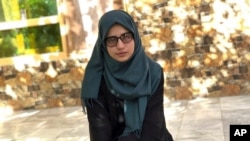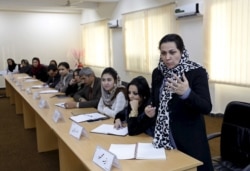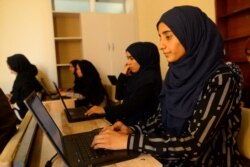An Afghan woman who this month scored the highest mark in the country’s national university entrance exam said that she plans to complete her education and then find a job, but she is not sure if it will be possible under the Taliban.
Salgai Baran, 19, whose exam results were the top out of 180,000 students, told VOA last week that she wants to complete her higher education in Afghanistan.
“I will stay if I can continue with my education. If the circumstances do not allow me to continue my education and achieve my goals, I would like to go abroad,” Baran said.
Abdul Baqi Haqqani, the Taliban’s designated acting minister for higher education, said Sunday that the group allows women to go to universities, but it bans mixed-gender classes and male teachers from teaching female classes.
“The people of Afghanistan will continue their higher education in the light of Sharia law in safety without being in a mixed male and female environment,” said Haqqani, according to Agence France-Presse.
On Tuesday, the Taliban urged women to stay home, calling it a “temporary” measure “to protect women,” until the group comes up with what it calls “a new procedure.”
Baran expressed uncertainty if she would be able to work under the Taliban. “My plan was to serve my country and my people, but I do not know whether circumstances would allow me to work.”
Despite assurances from the Taliban that they have no problem with female education and work, women fear that the militant group would once more impose their strict interpretation of Sharia, barring women from schools and workplaces.
Under the Taliban’s rule in the 1990s, women were deprived of their basic rights to education and employment. The group also forced women to cover themselves from head to foot and prevented women from leaving their houses without a male companion.
Heather Barr, a senior researcher for women’s rights in Asia for Human Rights Watch, told VOA that the statements that the Taliban have made to convince the world that the group believes in women rights “are not convincing anyone because everyone knows what their record is on women’s rights.”
‘Terrible moment’
“This is a terrible moment for girls,” Barr said, adding that Afghan women “feel that their future has been ripped away from them overnight.”
Before the fall of Afghanistan to the Taliban, women made up about one-third (100,000) of university students. About 3.5 million girls, out of roughly 9 million students, were attending schools in Afghanistan.
About 30% of civil servant jobs and 28% of parliamentary seats were held by women.
“The Taliban has such a history of violence that if they say that they suggest something then people think that they have to do that immediately,” said Barr.
Shinkai Karokhil, a former member of the Wolesi Jirga, the lower house of Afghanistan’s parliament, said the Taliban should clarify their stance on women.
“It is frustrating,” Karokhil said, that the Taliban “have not yet come with what will be the education system in the country.”
With the uncertainty about women and their role under the Taliban, thousands of Afghans, mainly young and educated, have been leaving the country.
She added that all Afghans, women and men, should have “the opportunity to get an education.”
Karokhil said that the brain drain would derail the progress made in Afghanistan. “This would definitely have negative effects on the gains of the last two decades.”
She said, however, that Afghan girls will continue their struggle, and “the world should not forget them.”






